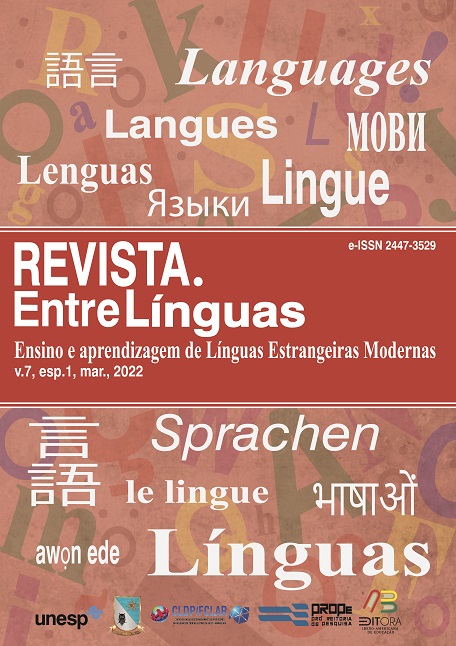Impacto da leitura de histórias no desenvolvimento e compreensão da linguagem dos alunos de EFL
DOI:
https://doi.org/10.29051/el.v8iesp.1.16916Palavras-chave:
Leitura de histórias, Interação de andaimes, Participação em sala de aulaResumo
Embora existam numerosos estudos de educação de alunos de EFL na literatura, a leitura de histórias recebeu pouca atenção do estudo. No entanto, apenas alguns estudos de pesquisa analisaram a leitura de histórias e seu impacto potencial no desenvolvimento da linguagem dos alunos de EFL. O impacto da instrução de leitura de histórias em inglês no desempenho dos alunos de inglês como língua estrangeira foi investigado neste estudo. De acordo com os resultados, o treinamento de leitura de histórias aumenta o envolvimento dos alunos, facilita a leitura de EFL e as composições de recordação de histórias. Por outro lado, estamos lidando com Storytelling, não apenas por prazer. Este estudo tem como objetivo diagnosticar os impactos da Contação de Histórias nos componentes linguísticos das habilidades de comunicação dos alunos e avaliar em que medida a Contação de Histórias pode ajudar os alunos a melhorar suas habilidades de comunicação. Os resultados demonstram que o Storytelling melhora as habilidades de leitura ao permitir que as crianças correlacionem significados e emoções com as palavras. Os alunos expandem seu vocabulário e aprendem quando e como utilizar palavras e frases específicas.
Downloads
Referências
AHMED, A. A. A.; GANAPATHY, A. Creation of Automated Content with Embedded Artificial Intelligence: A Study on Learning Management System for Educational Entrepreneurship. Academy of Entrepreneurship Journal, v. 27, no. 3, p. 1-10, 2021. Disponível em: https://www.abacademies.org/articles/creation-of-automated-content-with-embedded-artificial-intelligence-a-study-on-learning-management-system-for-educational-entrepre-11233.html. Acesso em: 10 fev. 2021.
ANWAR, S. ESL/EFL learners’ poor performance in English: The factors. Journal of Asian and African social science and humanities, v. 3, n. 1, p. 18-26, 2017. Disponível em: https://www.researchgate.net/publication/326588544_eslefl_learners'_poor_performance_in_english_the_factors. Acesso em: 10 jan. 2021.
CHEN, C. N. et al. The Effects of Extensive Reading via E-Books on Tertiary Level EFL Students' Reading Attitude, Reading Comprehension, and Vocabulary. Turkish Online Journal of Educational Technology, v. 12, n. 2, p. 303-312, 2013. Disponível em: https://eric.ed.gov/?id=EJ1015469. Acesso em: 04 mar. 2021.
GHORY, S.; GHAFORY, H. The impact of modern technology in the teaching and learning process. International Journal of Innovative Research and Scientific Studies, v. 4, n. 3, p. 168–173, 2021. Disponível em: https://ijirss.com/index.php/ijirss/article/view/73. Acesso em: 10 abr. 2021.
LARSARI, V. N. An investigation into Teacher Assessment Literacy (TAL) of Learners Writing Developments: Impact on learners writing achievements and Implications for Teacher Development. Journal of Social Sciences and Humanities Research, v. 9, n. 01, p. 93-100, 2021. Disponível em: https://journals.researchub.org/index.php/jsshr/article/view/1190. Acesso em: 10 abr. 2021.
LOTFI, S. A. T. et al. A Corpus-based Comparative Evaluation of Internationally Published vs. Locally Designed EFL Textbooks Regarding Politeness Strategy Teaching: Interchange vs. Prospect. Journal of Social Sciences and Humanities Research, v. 8, n. 3, p. 1-6, 2020. Disponível em: https://journals.researchub.org/index.php/JSSHR/article/view/900. Acesso em: 19 maio 2021.
MOHAMMADI, M.; POUYA, N. D. The Relationship between EFL Learners’ Mental Toughness and Critical Thinking. Journal of Social Sciences and Humanities Research, v. 9, n. 02, p. 25-36, 2021. Disponível em: https://journals.researchub.org/index.php/jsshr/article/view/1245. Acesso em: 02 maio 2021.
SUK, N. The effects of extensive reading on reading comprehension, reading rate, and vocabulary acquisition. Reading research quarterly, v. 52, n. 1, p. 73-89, 2017. Disponível em: https://ila.onlinelibrary.wiley.com/doi/10.1002/rrq.152. Acesso em: 14 abr. 2021.
TANG, S. et al. The Humor Story in Teaching Reading Comprehension. Journal of advanced english studies, v. 2, n. 2, p. 77-87, 2019. Disponível em: http://sastra.unifa.ac.id/journal/index.php/jes/article/view/65. Acesso em: 16 jun. 2021.
WAJNRYB, R. Stories: Narratives activities in the language classroom. Cambridge: Cambridge University Press, 2003.
Downloads
Publicado
Como Citar
Edição
Seção
Licença

Este trabalho está licenciado sob uma licença Creative Commons Attribution-NonCommercial-ShareAlike 4.0 International License.
Os manuscritos aceitos e publicados são de propriedade da Revista EntreLínguas. Os artigos publicados e as referências citadas na Revista EntreLínguas são de inteira responsabilidade de seus autores.
Transferência de direitos autorais – autorização para publicação
Caso o artigo submetido seja aprovado para publicação, já fica acordado que o(s) autor(es) autoriza(m) a UNESP a reproduzi-lo e publicá-lo na EntreLínguas, entendendo-se os termos “reprodução” e “publicação” conforme definição respectivamente dos incisos VI e I do artigo 5° da Lei 9610/98. O artigo poderá ser acessado pela rede mundial de computadores (Internet), sendo permitidas, a título gratuito, a consulta e a reprodução de exemplar do artigo para uso próprio de quem a consulta, desde que haja a citação ao texto consultado. Essa autorização de publicação 328 EntreLínguas, Araraquara, v. 1, n .2, p. 323-328, jul./dez. 2015 não tem limitação de tempo, ficando a UNESP responsável pela manutenção da identificação do(s) autor(es) do artigo. Os artigos publicados e as referências citadas na Revista EntreLínguas são de inteira responsabilidade de seus autores.











